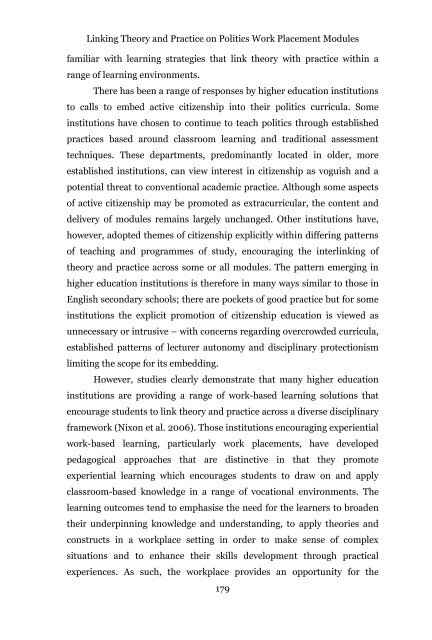The Scholarship of Engagement for Politics: - Higher Education ...
The Scholarship of Engagement for Politics: - Higher Education ...
The Scholarship of Engagement for Politics: - Higher Education ...
Create successful ePaper yourself
Turn your PDF publications into a flip-book with our unique Google optimized e-Paper software.
Linking <strong>The</strong>ory and Practice on <strong>Politics</strong> Work Placement Modules<br />
familiar with learning strategies that link theory with practice within a<br />
range <strong>of</strong> learning environments.<br />
<strong>The</strong>re has been a range <strong>of</strong> responses by higher education institutions<br />
to calls to embed active citizenship into their politics curricula. Some<br />
institutions have chosen to continue to teach politics through established<br />
practices based around classroom learning and traditional assessment<br />
techniques. <strong>The</strong>se departments, predominantly located in older, more<br />
established institutions, can view interest in citizenship as voguish and a<br />
potential threat to conventional academic practice. Although some aspects<br />
<strong>of</strong> active citizenship may be promoted as extracurricular, the content and<br />
delivery <strong>of</strong> modules remains largely unchanged. Other institutions have,<br />
however, adopted themes <strong>of</strong> citizenship explicitly within differing patterns<br />
<strong>of</strong> teaching and programmes <strong>of</strong> study, encouraging the interlinking <strong>of</strong><br />
theory and practice across some or all modules. <strong>The</strong> pattern emerging in<br />
higher education institutions is there<strong>for</strong>e in many ways similar to those in<br />
English secondary schools; there are pockets <strong>of</strong> good practice but <strong>for</strong> some<br />
institutions the explicit promotion <strong>of</strong> citizenship education is viewed as<br />
unnecessary or intrusive – with concerns regarding overcrowded curricula,<br />
established patterns <strong>of</strong> lecturer autonomy and disciplinary protectionism<br />
limiting the scope <strong>for</strong> its embedding.<br />
However, studies clearly demonstrate that many higher education<br />
institutions are providing a range <strong>of</strong> work-based learning solutions that<br />
encourage students to link theory and practice across a diverse disciplinary<br />
framework (Nixon et al. 2006). Those institutions encouraging experiential<br />
work-based learning, particularly work placements, have developed<br />
pedagogical approaches that are distinctive in that they promote<br />
experiential learning which encourages students to draw on and apply<br />
classroom-based knowledge in a range <strong>of</strong> vocational environments. <strong>The</strong><br />
learning outcomes tend to emphasise the need <strong>for</strong> the learners to broaden<br />
their underpinning knowledge and understanding, to apply theories and<br />
constructs in a workplace setting in order to make sense <strong>of</strong> complex<br />
situations and to enhance their skills development through practical<br />
experiences. As such, the workplace provides an opportunity <strong>for</strong> the<br />
179
















